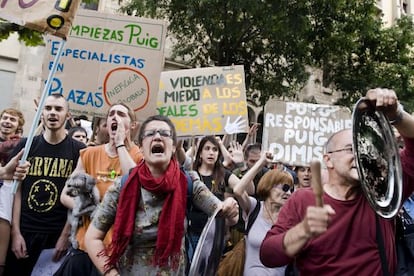Could a pair of minority groups spell the end of Spain's two-party system?
Opinion polls suggest that the public has had enough of the PP and the PSOE


The opinion polls all agree: Spain's two-party system is suffering from a kind of burnout that has not been seen in recent years. And the main beneficiaries of the steady decline in voter support for the Socialist Party (PSOE) and the Popular Party (PP) are the leftist coalition United Left (IU) and the center party Union, Progress and Democracy (UPyD).
IU - which is a veteran association of communists, republicans and environmentalists, and typically garners between three and 10 percent of the vote at general elections - and the UPyD - a newcomer to the political scene, which has been quickly gaining traction on a socially progressive, economically liberal program - are both facing a turning point that will test their organizations, their internal structures and their campaign promises.
A recent simulation of election results conducted by the polling firm Metroscopia showed IU and UPyD obtaining 16 percent and 11 percent of the vote, respectively, more than twice what they achieved at the November 2011 general elections.
Analysts concur that support for Spain's two traditional parties is eroding due to their mismanagement of the economic crisis - first the Socialists, and now the PP - and because of the litany of corruption scandals that are making the news. At the same time, the minority parties are riding a wave of popular demand for a democratic overhaul of the system, promising a different approach and fewer vested interests.
IU and the UPyD are facing a turning point that will test their organizations
So can these two groups really grow any more than they already have? And what are the challenges in the run-up to the 2014 European elections and the 2015 local and regional polls? Both IU and UPyD are aware that this is their moment in the limelight, and both are ruling out any significant changes to their vision should they secure a larger share of power. But the similarities end there.
IU must find a way to smoothly bring together various agents of social protest, such as the unions, the 15-M popular protest movement and its offshoots, and the anti-eviction activists, all of whom now comprise a motley opposition to the conservative government of Prime Minister Mariano Rajoy. Besides that, IU needs to strike a balance between these groups' anti-establishment attitude and a sense of government, so it can truly emerge as an "alternative to neoliberalism."
"People are demanding accountability from us," says IU's national coordinator, Cayo Lara. "They want us to go further than just protest; they want us to propose government action."
The leftist coalition can almost touch the scenario reflected in some polls, which place IU above the PSOE in voter intention for the first time ever, and award it nearly three times the vote share it managed in November 2011 (6.9 percent).
Support for the main parties is eroding due to the way they have handled the crisis
"Our goal is no longer simply to surpass the 10-percent barrier," explains Ramón Luque, an IU official. "First there is a battle for social and political hegemony, and after that, for electoral hegemony as well."
This challenge is best understood in the context of the "crisis" gripping the main opposition party at the moment. "The PSOE has an identity problem that has to do with article 135 of the Constitution [a ceiling on public spending that the Socialists and the PP agreed to in September 2011 in a rare show of consensus], leaving millions of voters feeling orphaned," says Luque.
"We're going to keep the same road map we've had until now," insists Lara. "We've been at the protests, we've been out there with the union movement at all the strikes we considered legitimate, both against [Socialist prime minister] Zapatero and against the PP. There isn't a single sector that hasn't peacefully protested the policies of the current government. And we've been in the DNA of this opposition."
This presence and this nexus are guaranteed by Alberto Garzón, one of the most promising politicians in terms of support from IU and other leftist voters. Garzón is a firm believer in the power of dialogue to create "a bloc for social and political progress," says Lara. This will require the expansion of the group's structure. "We've been receiving more citizen trust than we have the organizational means to deal with, so we have to reinforce the organization."
The left must find a way to bring together various agents of social protest
IU has not yet officially launched the debate on who the candidates for next year's European elections will be, and whether Lara himself will be replaced in 2015. For now, the national coordinator, who has held the post since 2008, seems to be scrambling for time to develop new strategies based on regional partnerships: "This worked in earlier elections," he says. "In Galicia, we reached a deal with a political group like Anova [radical nationalists] and it went really well." In fact, they gained nine members in the regional assembly. "It worked in Aragon because we reached a deal with [the nationalist] Chunta Aragonesista; and in Navarre, with green sectors and anyone else who cared to join us, because we issued a broad offer to anyone in leftist circles."
Over at UPyD, it's a different scenario. Founded in 2007 by a group of politicians and intellectuals, including former Socialist deputy Rosa Díez, who is now the party's spokeswoman and president, and philosopher Fernando Savater, the centrist party touts itself as "a necessary alternative" to the bi-party system.
"That's why we started this, because we were convinced there was a crisis in the traditional party system," explains Carlos Martínez Gorriarán, a founding member. "We sensed that an economic crisis would reveal those deficiencies, which include: a state that shows little respect for the law, rampant corruption and dysfunctional institutions."
The goal now, he adds, is to move toward "an advanced democracy," which is what, he says, "makes us different from IU and the 15-M movement."
UPyD wants to use lawsuits to overhaul institutions such as savings bank Bankia
Gorriarán notes that back in 2007, no bank would grant a loan to the newly formed party. "We ran in those elections on the strength of membership fees and small private donations," he says, because lenders thought the existing system was "very solid." Now, with five deputies sitting in Congress, 6,000 card-carrying members and a presence in dozens of institutions, UPyD is continuing its work enthusiastically, convinced that it has become evident that "the system can be changed."
UPyD remains faithful to its rhetoric about the need for democratic regeneration. "Resolving the political crisis is the necessary prior condition to resolving the economic crisis," says Gorriarán. "The two-party system is affected by a severe crisis that is more than just political, and it may be gaining momentum. But we also need to take the polls with a pinch of salt, and avoid viewing them like a prophetic forecast. They simply detect the state of mind at the present moment; there are two-and-a-half years left [to the next general elections], although it is possible that the deterioration of the two-party system will only get worse."
The party accepts that, even if it obtained no more than 10 or 12 percent of the vote at the next general elections, it would still represent an extraordinary result compared with the 4.69 percent it achieved in 2011.
UPyD insists on overhauling the institutions through tools like the lawsuits and complaints it brought against the management of Bankia, the coalition of savings banks that had to be nationalized in 2012 to avoid collapsing. UPyD revealed that executives made millions of euros in self-appointed wages between 2007 and 2010, in the midst of the crisis.
We sensed that an economic crisis would reveal Spain's deficiencies"
The party, which is constantly bringing up the need for greater transparency, is also very active in its search for economic alternatives for Spain, and in particular for the labor market, although its vision shares little with that of IU. It works with foundations and groups from different ends of the political spectrum in order to develop these ideas.
"We work with FEDEA [Foundation of Applied Economics Studies] and we would like to help the institutions develop ideas that do not come out of the political parties but out of civil society," says Gorriarán. "We are proposing a type of democracy that is enlightened, advanced, transparent, efficient, and able to promote talent instead of crushing it. We have 10 or 12 years ahead of us," he explains. "Time enough to avoid the temptation of turning into a traditional party."
CAYO LARA - National coordinator of United Left

It's not Karl Marx, and it's not an image of the hammer and sickle - it's not even a picture of his wife and kids. The painting that presides Cayo Lara's office in Congress is a framed crust of bread that a fellow native of his home town, Argamasilla de Alba (Ciudad Real), presented him with on the day after the 2011 elections.
"We're going to get minimum wages with the PP's absolute majority," the man warned. "And so it came to pass," confirms Lara. "The government's first measure was to freeze the minimum monthly wage at 641 euros. Rajoy rode out of his house with his plow, like they say back home, destroying everything that got in his way - and he's still at it."
Endowed with a sturdy build and a deep voice, Lara is still a powerful presence at 61 years of age. He answers the first question with another question: "Would you be happy if your popularity ratings went up but your partner and your children were out of work?" he enquires. "Well, that's my situation, like so many other people, and I'm not exactly overjoyed. I do feel a great sense of responsibility, though. People would not forgive smugness right now, given the terrible personal circumstances of many individuals. On the contrary, society is becoming increasingly demanding of politicians, and that's a good thing, because maybe until now we were less committed than we should have been."
Cayo, an only child, did not fight for democracy nor demonstrate in front of Franco's riot police. His family needed help, and so he dropped his studies at age 13 to work the land that his father leased from the landowners, growing cereal, alfalfa and above all melons. In fact, it was melons that he handed out for free one day in protest at low market prices - it was his first political action on the long road that has brought him to the national legislature.
"Until I was in my twenties and got in touch with agricultural unionists and grassroots Christians, I had no idea that the world was not the way I'd been told," he reminisces. That was when he decided to do something to change it. When he is criticized about lacking academic training and experience in government, Lara hits back by citing the 12 years that he was the Communist Party mayor of his village, which has a population of 7,000. He ran it, he says, with his head in the clouds and his feet on the ground.
"I am an idealist like Don Quixote, but increasingly also more pragmatic like Sancho. It's good for dreams to fuel politics, but it's the means that make it possible," he says.
The first display of leadership by the "country bumpkin," as some people viewed him at first, was to put a lid on the pressure cooker that was United Left in 2008, when he took over from Gaspar Llamazares. His supporters say he brought differing views closer together. His detractors say he did it by "stifling" other currents of thought within the IU thanks to his communist majority.
The departure of high-profile members such as Rosa Aguilar and Inés Sabanés attest to the heat of the battle. But he says that the coalition's dirty linen should not be aired in public. "I don't give a hoot whether someone is more or less 'red' than me," he says. "What I'm asking for are proposals."
In exchange, he offers proximity and the faith of the convert. "He even tries to convince the journalists," confides a colleague. "He's softened up his image to make himself more attractive to more people," adds another. Or, as Lara himself prefers to put it: "People are no longer scared of us."
Occasionally he takes a look at the piece of bread hanging in his office. It serves as a timely reality check, should he ever start feeling high and mighty.
ROSA DÍEZ - Leader of Union, Progress and Democracy

At 60, Rosa Díez is still a fashion victim. There she is in Congress, dishing out criticism to the government and the opposition in her designer outfits and striking haircuts. Sometimes she paints each fingernail a different color, which happens to be the latest trend in manicures. It's not a bad symbol for the broad spectrum of proposals that make up Union, Progress and Democracy (UPyD), the party she helped to found in 2007 after losing all hope of securing a leadership position within the Socialist Party.
Her program is a cocktail of ideas from the moderate left, the center and the liberal right, and it is garnering unexpected support for such a young party, and one so apparently dependent on a single figure. Even though UPyD has five members in Congress, everyone sees this very much as Rosa Díez's party.
"A favorable opinion poll doesn't make Rosa feel any more superior," says a former Socialist colleague. "She always feels superior. Her ego is way out of control."
"At my age, I am highly aware of my limitations; that is why I surround myself with people who are better prepared than myself," Rosa explains during a telephone interview with EL PAÍS. "The thing is, I am pleased. We created UPyD to meet demand outside the two-party system, and now it really has a place to go." Is she just an outcast from another party? "I don't think so. People who are angry at the system go elsewhere. UPyD feels that parties are essential to regenerate democracy. I'm over the ego thing, but I never give up a battle, maybe because I grew up with that attitude."
Married and a mother of two, Díez is the daughter of a Socialist metalworker who was sentenced to death by the Franco regime, before the sentence was commuted. Her mother sewed tirelessly to bring home some extra money, but Rosa was unable to study, even when she won scholarships. "It wasn't about not spending, but about contributing," she recalls. So she was a clerical worker, passed a national examination for a government job, and channeled her energy into politics. The rest is history: she was a unionist with UGT, a commissioner for the Basque government, a eurodeputy, and a dissident who walked out of the Socialist house to build her own home.
The philosopher Fernando Savater, co-founder of UPyD, still remembers her standing on a box, looking skinny and sounding epic, as she roused a crowd... of around four people. "There are lots of us who make up this party, but sometimes she takes on the load by herself - with no money, no media support, door to door. It takes guts, and Rosa has them," he says. "Perseverance matters, but the internet was key," adds Díez, who is the only "professional politician" in a party where "90 percent of members have not had contact with her."
"I've been in politics for over 30 years, giving the best of myself, and I'm not going to be apologetic now. It's not professional politicians who are bad, but the professionals of politics who use it for their own benefit."
That is why she carefully considers everyone who comes knocking at her door. Now, she says, there is a line of people wanting to join the party. "When someone comes and says they can bring me 200 people, that's bad. Those are the angry outcasts, and they want something in return." While she waits for the big moment of truth, Díez acts as the self-appointed scourge of the PP and the PSOE in Congress. She has noticed changes there, too. "People who never used to talk to me are now sucking up to me - it's fun," she laughs. Sometimes, her stern governess outfits make her look like a housekeeper. If trends keep up, UPyD could be walking into many institutions in the coming years. "I am not interested in the key, but rather in the door," she quips. "I want to walk in, get some fresh air in the place and get things done."
Tu suscripción se está usando en otro dispositivo
¿Quieres añadir otro usuario a tu suscripción?
Si continúas leyendo en este dispositivo, no se podrá leer en el otro.
FlechaTu suscripción se está usando en otro dispositivo y solo puedes acceder a EL PAÍS desde un dispositivo a la vez.
Si quieres compartir tu cuenta, cambia tu suscripción a la modalidad Premium, así podrás añadir otro usuario. Cada uno accederá con su propia cuenta de email, lo que os permitirá personalizar vuestra experiencia en EL PAÍS.
¿Tienes una suscripción de empresa? Accede aquí para contratar más cuentas.
En el caso de no saber quién está usando tu cuenta, te recomendamos cambiar tu contraseña aquí.
Si decides continuar compartiendo tu cuenta, este mensaje se mostrará en tu dispositivo y en el de la otra persona que está usando tu cuenta de forma indefinida, afectando a tu experiencia de lectura. Puedes consultar aquí los términos y condiciones de la suscripción digital.








































